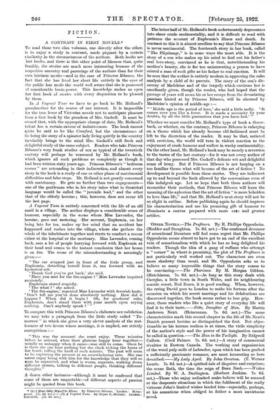`OTMAR NOVEIS.—The Profiteers. By E. Phillips Oppenheim.
(Hodder and Stoughton. net.)—The confirmed devourer of sensational literature will feel some regret that Mr. Phillips Oppenheim seems almost to have got to an end of the excellent vein of sensationalism 'with Which he has so long delighted his readers. Though the idea of a gang of ruffians who attempt a " corner " in 'wheat is promising, the plot of The Profiteers is not particularly well worked out. 'The characters are even more shadowy than usual, and Mr. Oppenheim asks us to believe so many impossible things that the story ceases to be convineing.—The Pharisees. By M. Morgan Gibbon. (Hutchinson. 7s. -6d. net.)—As long Las this story deals with !Caerglas, a little -town in South Wales, and its neighbouring seaside resort, Red Roses, it is good reading. When, however, the erring -David goes to London to -make his fortune after the occasion on which his secret marriage and his defalcations are discovered together, 'the book seems rather to lose grip. How- over, -those readers who like a quiet story of everyday life will ' find it to their taste.—Ditte, Daughter of Man. By Martin Andersen Nexo. (Heinemann. 7s. (Id. net.)—The same characteristics mark this second chapter in the life of Mr. Nexo's Danish peasant herbine as distinguished the first. But objec- tionable as his intense realism is at times, the virile simplicity :of the author's style and the power of his imagination cannot be called in question.—The Man in the Twilight. By -Ridgwell Cullum. (Cecil Palmer. 7s. (Id. net.)—A story of commercial rivalries in Eastern Canada. The -working and organization of the wood-pulp-mills of Labrador, upon which haa been grafted a sufficiently passionate romance, are most interesting as here described.—My Lady April. By John Overton. (T. Werner Laurie. 'Is. (Id. net.)—A- spirited tale of disguises and surprises; the-scene Bath, 'the time the reign of Beau Nash.—Wishes Limited. By W. A. 'Darlington. (Herbert Jenkins. '78. 6d. net.)—Those who enjoy unlimited make-believe will be amused at the desperate situations in which the fulfilment of the really virtuous John's limited wishes landed hine—especially, perhaps, at .his sensations when obliged to :father a most unvirtuous novel.


































 Previous page
Previous page